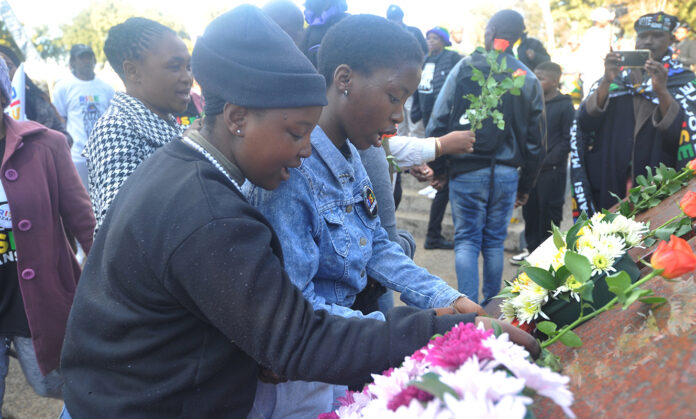On June 16, 49 years ago, Black Consciousness-inspired school pupils went out to demonstrate against being forced to learn in Afrikaans.
It has to be recalled what the attitude of Africans to the language was at the time.
It was the language through which apartheid infliction was communicated and felt by the victims. Its sound was a stark reminder of the jackboot of apartheid on our collective neck.
While Black Consciousness had rekindled the revolutionary fire to act against the entire oppression mechanism, the enforcement of Afrikaans as a medium of instruction lit the fuse.
The school pupils embarked on a peaceful demonstration against the order. But the regime’s police shot at the school pupils, and all hell broke loose, resulting in many of the pupils meeting their untimely deaths.
But as history has unfolded, it has been proven that their deaths were not in vain.
The regime began to dismantle the apartheid legal infrastructure in the period that followed. This was given the threat of international sanctions as the international community, shocked by the callous killing of children, began to consider sanctions against the apartheid regime.
While on the day, the days just before, and the days that followed, the black community was bound together by the spirit of Black Consciousness, and all had a common purpose (to bring down the regime); recently (and several years prior), a variety of “tribes” that go with the names ANC, EFF, DA, etc, each hold separate rallies around the country, all claiming to be commemorating June 16, 1976.
Surprisingly, the one aspect of June 16 that is essential to celebrate is the unity that had been forged within the black community.
These Johnny-come-lately “tribes” do not go to the graves of those who died then, say nothing about those who were involved, lie about the day, and talk rubbish about the youth.
There is no mention of the philosophy of Black Consciousness that inspired the 1976 children, nothing about the community oneness that existed then.
These parties have no qualms displaying in no uncertain terms that society is now composed of rigidly separate “tribes”, each doing its own thing – an insult really to the spirit that pervaded events of June 16, 1976.
Nothing is said about Black Consciousness, “the quest for true humanity”.
Questions asked are about the status of youth in the country, not about how much we have gained in the recovery of our humanity as black people, which was the mantra that inspired the 1976 crowd.
Worse still, the day is celebrated, rather than commemorated. The month of June is today called “Youth Month”, instead of Black Consciousness Month. If truth be told, the June 16, 1976, was the climax of the Black Consciousness effort.
As Mokgethi Motlhabi put it in the book, Black Resistance To Apartheid, “Soweto, as a whole series of country-wide events it occasioned are now summed up, is better understood as a manifestation of Black Consciousness rather than the direct result of the implementation of organisational policy.”
Asked about the success of Black Consciousness in an interview with a European journalist, Steve Biko replied, “In one word, Soweto! The boldness, dedication, sense of purpose and clarity of analysis of the situation – all these things are a direct result of Black Consciousness ideas among the young in Soweto and elsewhere.
This is not quantitatively analysable, for the power of a movement lies in the fact that it can indeed change the habits of people. This change is not the result of force but of dedication, or moral persuasion”
It is not a day of rallies at stadiums but a day of sounding a bell in every town at midday with all observing a moment of silence wherever they are.
• Dr Kenosi Mosalakae is a medical doctor, concerned with societal issues



